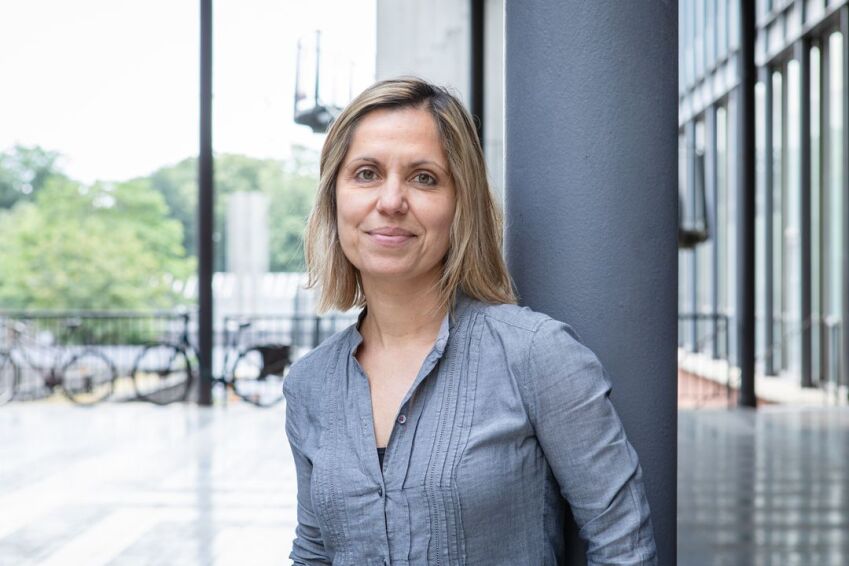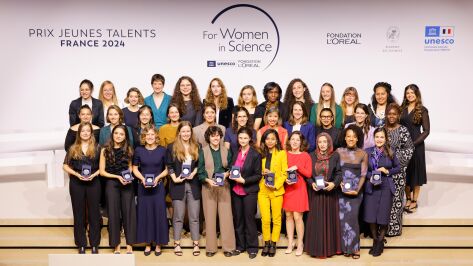 新闻
新闻 
CNRS medal of innovation 2024: an alumni is laureate
The CNRS (French national centre for scientific research) has just published the names of three winners who received the Medal of Innovation this year. And among them is an alumni: Eleni Diamanti, a Franco-Greek physicist, quantum physics specialist, research director at CNRS, who was a postdoc researcher at the Institut d'Optique at Palaiseau (University of Paris-Saclay).
Since its creation in 2011, the Medal for Innovation has rewarded and honoured scientists who are recognised in their fields and whose research has led to “breakthrough technological, economic, therapeutic and social innovations that bring more value to the French scientific research”.
Eleni Diamanti, a researcher and startuper
As the CNRS points out, the careers of the three winners of the CNRS Medal of Innovation 2024 show not only “the excellence and variety of the research led at the CNRS”, but also “the diversity of the ways in which it is developed to bring value”.
And the first case is of Eleni Diamanti, who was the subject of a glowing article in French newspaper Le Monde last November. With an article entitled “Eleni Diamanti, l'accélératrice du quantique” (Eleni Diamanti, the quantum accelerator), Le Monde presents a “specialist in quantum communication protocols”, who is also a CNRS research director at the LIP6 laboratory at Sorbonne University. According to the article, she “succeeded in creating a synergy between computer scientists and physicists” and has also “contributed to bringing quantum technologies out of the lab”.
Diamanti was born in 1977 in Athens, and grew up in Greece in a family of physics teachers. She has learnt English and French at a very young age. In 2000, she graduated from the National Polytechnic University of Athens with a degree in electrical and computer engineering, then studied in the United States at Stanford University, to pass a PhD in electrical engineering. She returned to Europe in 2006 and moved to France, where she joined the Institut d’Optique de Palaiseau as a post-doctoral researcher. There, she worked with “one of the leading specialists, Philippe Grangier, who had taken part in Alain Aspect’s experiments for which he was awarded the Nobel Prize in 2022”.
In 2009, the CNRS recruited her to design “communication networks using photons as information transmitters”, explains the research centre. Works led by the research director “landed the first bricks of a quantum Internet which will be stronger against attackts, to transfer information more securely”. Diamanti then “took her work out of the lab” and used it to jointly found Welinq, a startup “developping quantum memories”. Today, Eleni Diamanti is very committed in the “French and European quantum information ecosystem”, and thanks to her recognised expertise she managed to work with major international companies such as Airbus, Deutsche Telekom, Orange or Thales.
Experienced researchers and inventors
Two additional researchers have been recompensed with Diamanti: chemist Cyril Aymonier and physicist Lydéric Bocquet, who, just like her, are “outstanding researchers” and “experiencied inventors”, says the CNRS.
CNRS research director Cyril Aymonier works on “the synthesis, shaping and recycling of new materials using unconventional and sustainable approaches”. His research “layed the foundations for about 50 patents”, which led him to work with companies such as Safran, Arkema, Saint-Gobain, Renault, Airbus, and more. Cyril Aymonier also created the startup IDELAM in 2019 to exploit “a unique delamination technology for recycling complex multi-component materials”.
And Lydéric Bocquet, also research director at the CNRS, is “a pioneer in nanofluidics”, a field which, described by the CNRS, as being “at the crossroads of fluid mechanics and molecular, even quantum, physics”. In this speciality, he “designs systems, such as membranes for examples, with innovative properties”. Lydéric Bocquet has filed twelve patents, and founded four start-ups offering solutions for applications as diverse as renewable energy production, removing alcohol from beverages such as beer and wine, and desalinating seawater at lower cost.
The three winners will all receive their medal in December 2024.
Explore more:





Commentaires
Vous devez être connecté pour laisser un commentaire. Connectez-vous.